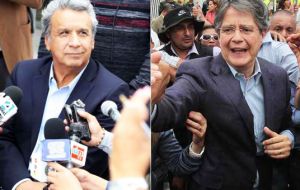MercoPress. South Atlantic News Agency
Will Ecuador confirm the conservative-turn-tendency in South America?
 Moreno beat pro-business banker Lasso by more than 10 points in the eight-way first round in February. But 60% of voters opted for candidates opposing Moreno
Moreno beat pro-business banker Lasso by more than 10 points in the eight-way first round in February. But 60% of voters opted for candidates opposing Moreno Voters in Ecuador will be going to the polls on Sunday for the presidential runoff and a choice between a traditional South American leftist and a conservative ex-banker, that will steer the oil exporting country for the next four years. It will also show if South Americans are effectively abandoning populist ideas as happened in Argentina, Peru and Brazil.
Lenin Moreno, former vice-president to left leaning President Rafael Correa led the first round vote in February but did not gain the 50% he needed for a first round win against conservative opponent Guillermo Lasso. So the two men go head to head in a run-off election this Sunday to decide who takes over the presidency in May. Correa is barred by the constitution from seeking re-election.
Moreno beat pro-business banker Lasso by more than 10 points in the eight-way first round vote in February. But as more than 60% of voters opted for candidates opposing Moreno, a win for the conservative seemed on the cards.
Voters have expressed concern over the state of the economy and a reluctance to vote for the left-wing PAIS Alliance after a decade of Correa's “Citizens Revolution” which rewrote the constitution, increased government spending and raised the minimum wage but has been weakened by a reliance on oil as world prices fell. The economy has entered into a recession, thousands of state workers have been laid off and state finances are insecure. The economy is forecast to shrink 2.7% this year, according to the International Monetary Fund.
But in the last opinion poll held a week before the run-off vote on Sunday, Moreno had risen to a 52% share over 48% for Lasso.
Lasso's decline in the opinion polls could be explained by revelations over his past business activities. Lasso is the major shareholder, via his GLM trust, of Banco Guayaquil which is one of Ecuador biggest lenders.
As an investor, and the bank's executive president for more than 20 years, Lasso was a major beneficiary of the profits from a program at the end of the 1990s of purchasing cheap IOUs given to depositors who had their savings frozen to avert a bank run while inflation was soaring. The government later bought back the IOUs at full value, resulting in substantial profits for the bank and its investors.
According to media reports, which Lasso denies, some of his profits were siphoned to offshore tax havens. Correa had been the first head of state to commit to Oxfam's “Even it Up” campaign to eliminate tax havens in Latin America and the Caribbean.
But Lenin Moreno has not come through the campaign unscathed as allegations continue that Brazilian construction conglomerate Odebrecht paid bribes to 18 Ecuadorian politicians who were identified by codenames such as “Grosso,” “Lights” and “Chanceller” according to the physical characteristics, personality traits or professional status of those receiving bribes. The names were published in the “Expreso” newspaper in January which alleged Odebrecht won contracts worth US$1.6 billion during the Correa administrations.
Lasso has also accused the ruling party of covering up the scandals, stifling media and placing party loyalists in key positions within the state institutions.
Lasso has also promised to remove Wikileaks founder Julian Assange from the Ecuadorean embassy in London where he has been since 2012 after asking for asylum, fearing extradition via Sweden to the US.
So voters face a choice between a 64-year-old 2012 Nobel Peace Prize nominee for his advocacy for people with handicaps and a 61-year-old banker pledging to create a million jobs in Ecuador.
The count following the February poll was criticized for being slow. The electoral authorities attributed the delay to the slow arrival of ballots from remote regions and consulates abroad, as well as to inconsistencies.
Trump predicted “a very difficult” meeting in a tweet just hours after both governments announced the summit. He wrote in part: “We can no longer have massive trade deficits and job losses. American companies must be prepared to look at other alternatives.”




Top Comments
Disclaimer & comment rulesCommenting for this story is now closed.
If you have a Facebook account, become a fan and comment on our Facebook Page!